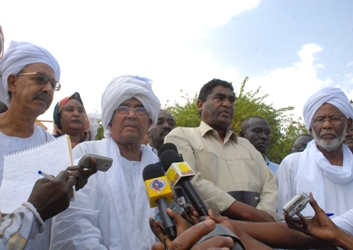Divergences among Sudanese opposition delay signing of political charter
June 26, 2012 (KHARTOUM) – Strained relations between Sudanese opposition parties have prevented them once again from signing a common political platform and a constitutional framework for the interim period after the fall of the regime of President Omer Al-Bashir.

The NCF forces failed in a meeting held Tuesday to adopt a text of the Democratic Alternative and the Constitutional Declaration aiming to administrate the country once the regime of the National Congress Party (NCP) is down.
PCP leader Hassan Al-Turabi left the meeting before its end after divergences over the participation of the Umma and DUP in the signing of the two texts, sources close to the meeting told Sudan Tribune.
The Umma Party delegates at the meeting showed some reservations on the documents pretexting that the party chairman did not yet read it, the sources added.
Turabi who was angered by the remark said that his party will work hard to bring down the regime. He further stressed that the next change will be the property of the people and it will not be done by the political forces.
Later, the signing ceremony was adjourned to the next week “for more consultations”.
Sadiq Al-Mahdi, head of the largest opposition party of Umma, is blamed by the opposition forces for his dialogue with the regime and his call for a comprehensive and inclusive process including the ruling NCP and the rebel groups. He is also slammed for his criticism against rebel groups who wage war in Darfur, Blue Nile and South Kordofan.
Mahdi says only an inclusive constitutional conference, under the current conditions and after the independence of South Sudan, can allow to avoid chaos and dismemberment of the country.
Form his side the DUP leader who was the leader of the former opposition National Democratic Alliance decided to join the NCP in its first government after the secession of the South saying that the territorial integrity of the country is in danger.
Al-Mirghani was opposed the independence of South Sudan. He has troubled relations with the leadership of South Sudan ruling party, SPLM, after the death of his old friend and ally John Garang.
The Constitutional Declaration provides to establish a collegial head of state, Council of Sovereignty, a government and a legislative council that will lead the country during three years of the interim period.
Since the recent announcement of austerity measures by President Bashir, Sudan is witnessing a wave of protests in different towns across the country.
Last Friday, the capital Khartoum saw the participation of Sudanese from different social segments and areas in the demonstrations held after the Friday prayer. Youth and student groups launched a call for a greater mobilisation for next Friday which coincides with the 23th anniversary of Bashir coupd’etat of 1989.
The ruling party yesterday said it received an initiative from the Umma’s leader Sadiq Al-Mahdi to hold a conference for peace in Sudan.
NCP political secretary Hassabo Mohamed Abdel Rahman told Al-Intibaha newspaper on Tuesday that dialogue on the national agendas with the Umma party will continue.
Last week, Al-Mahdi repeated in a press conference that his party remains in the opposition despite criticisms but he emphasized on the need to reach an agreement preserving Sudan’s unity.
(ST)
